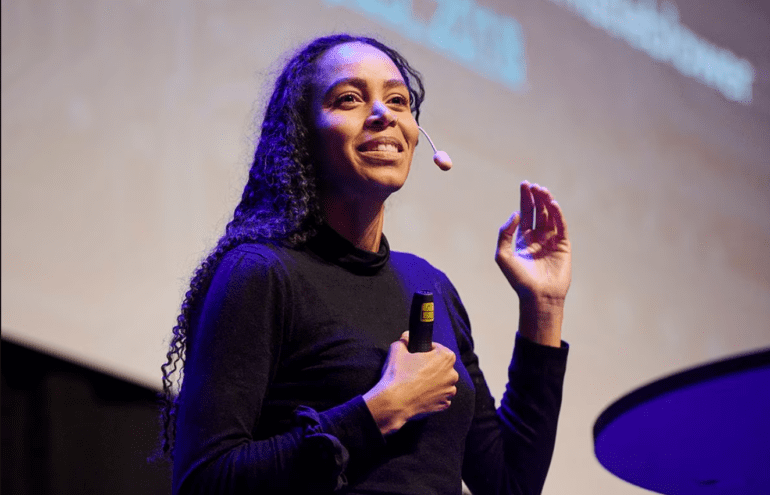TL;DR:
- Pelonomi Moiloa, CEO of Lelapa AI, champions AI solutions tailored for African contexts.
- Moiloa’s journey from engineering to AI research culminated in founding Lelapa AI.
- Lelapa AI focuses on countering biases in AI models and incorporating African languages and culture.
- VulaVula project by Lelapa AI enhances linguistic support in underrepresented languages.
- Moiloa expresses concerns about the potential exploitation of African resources in AI production.
- Despite challenges, she remains optimistic about AI’s transformative potential in Africa.
Main AI News:
In the realm of artificial intelligence, Lelapa AI’s website proudly proclaims, “AI for Africans, by Africans, solving African problems.” Leading this groundbreaking venture is Pelonomi Moiloa, the co-founder and CEO. She’s a data scientist whose unwavering commitment is to craft tech solutions that bear the African imprint, aiming to enhance lives across the continent.
Moiloa, a standout figure in the AI landscape, earned recognition in Time magazine’s list of the 100 most influential individuals in artificial intelligence for 2023. Her journey commenced with a dual major in biomedical and electrical engineering at the University of Witwatersrand, South Africa, before venturing to Japan in 2016 for a master’s degree at Tohoku University. It was in Japan that her focus gravitated towards AI, specifically deep learning, which is a branch of artificial intelligence. Her research honed in on the application of deep learning in neurophysiology.
Returning to South Africa, Moiloa devoted her professional career as a data scientist to the financial sector for eight years. It was during this period that her convictions grew strong enough to give birth to her own company.
“Lelapa AI was founded because experience has shown us that when we import models developed in the West to deploy them in the African context, they often fail. Sometimes, this technology not only doesn’t work but proves harmful,” elucidates the visionary entrepreneur. She emphasizes that AI biases, which are detected globally, pose even graver threats in Africa. She elucidates with an example: “The legacy of apartheid in South Africa has caused certain people to reside predominantly in certain areas. Therefore, when you use location in a credit model to determine eligibility for a mortgage loan, race may inadvertently become a factor.” Moiloa highlights how technology can unwittingly perpetuate existing biases, thus entrenching power imbalances and discrimination.
In her quest to combat these biases, the founder of Lelapa AI adopts a proactive approach. She asserts, “We meticulously curate the data that we feed into the machine. Instead of allowing a ChatGPT to access the entire internet, including undesirable content, we exercise a level of moderation, guiding the machine’s exposure.” This approach involves incorporating African languages into AI language models and infusing content that reflects the philosophies and worldviews of the continent.
A paramount concern for Moiloa is addressing the underrepresentation of African languages in technology, a challenge that numerous scientists and African linguists are striving to rectify. She underscores the importance of giving voice to these languages, as they possess rich nuances and unique characteristics. Moiloa’s overarching goal is to develop technology within a framework that celebrates the cultural heritage of Africa. She asserts, “We must decolonize technology, aligning it with our history, languages, and the data that nourish these tools.”
This philosophy underpins Lelapa AI’s flagship initiative, the VulaVula project. This endeavor focuses on Natural Language Processing, a facet of AI technology used in machine translation and voice assistants. VulaVula extends linguistic support to underrepresented languages, starting with Zulu, Xhosa, Sesotho, and Afrikaans. The applications of this technology span from enabling access to public information to enhancing customer service for South African businesses.
Moiloa is vigilant about the misuse of AI, not only in generating fake news but also in inundating the digital realm with content that obscures the line between reliable and unreliable information. Yet, her primary concern remains more tangible.
“Once again, many of the essential resources for this new technology are found in Africa. The European Union, for instance, relies on African countries like Guinea, the Democratic Republic of the Congo, and South Africa as key suppliers of critical raw materials, such as bauxite (used in aluminum production), tantalum (for electronic equipment), iridium, ruthenium, and rhodium. Africa has endured resource extraction for over a century, with the aim of cheapening these resources. The prospect of these resources becoming even more valuable raises concerns. International actors may seek to exploit this situation, potentially destabilizing the region. We need to find ways to safeguard ourselves,” warns Moiloa.
Despite her awareness of technology’s pitfalls, Moiloa remains an optimist. She cites instances where AI has been a force for good, such as combating locust invasions in the Horn of Africa, aiding farmers in pest control, improving healthcare access through initiatives like South African MomConnect, facilitating microfinance, and enhancing education in South Africa.
“I’m deeply enthusiastic about Africa,” she declares with conviction, acknowledging challenges like internet connectivity, energy production, and technology accessibility in remote areas. Nonetheless, Moiloa envisions Africa as a model, demonstrating that colossal machines requiring exorbitant investments are not prerequisites for substantial progress. She believes that AI can address genuine human needs, offering tangible solutions that benefit humanity.
In her concluding remarks, Moiloa emphasizes the global perspective of Lelapa AI’s technology development. Their approach centers on integrating indigenous concepts, avoiding extractivism and exploitation, and prioritizing the well-being of communities. In this way, they aspire to connect people worldwide and pave the way for innovation that benefits all.
Conclusion:
Pelonomi Moiloa’s visionary leadership at Lelapa AI signifies a crucial shift in the AI market. Her commitment to crafting AI solutions tailored to African contexts, combating biases, and incorporating African languages and culture reflects a growing emphasis on localization and ethical AI development. Furthermore, her concerns about the exploitation of African resources in AI production highlight potential geopolitical implications. As Africa emerges as a promising AI market, companies that align with Moiloa’s vision of responsible, culturally sensitive AI are likely to find opportunities for innovation and growth.

